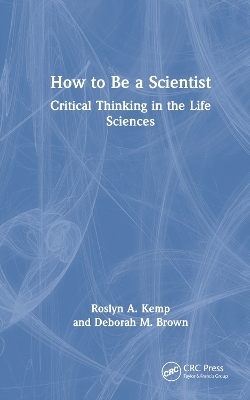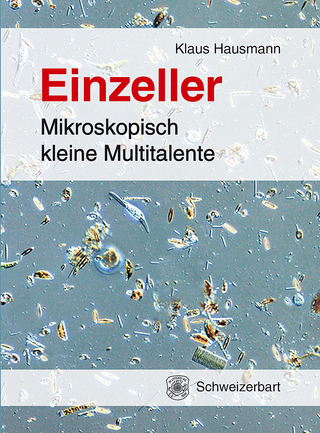
How to Be a Scientist
Taylor & Francis Ltd (Verlag)
978-1-032-58469-0 (ISBN)
Many undergraduate students choose a science degree but are not aware of how science and research work in the real world. We explain the processes of collecting, sharing and, most importantly, critical analysis of scientific research, with a focus on the life sciences. This book explains how scientific research is conceived, carried out and analysed. It outlines how research findings are constantly evolving and why that is exciting and important. Students using this textbook will learn how to design experiments, explain their data and analyse and interpret the work of others. They will learn to think about broader aspects of science, such as bias and ethics. They will gain practical skills, including understanding the use of statistical tests and how to prepare an effective presentation. Active individual and class exercises provide opportunities for students to think about difficult concepts in science and research and to include their own perspectives.
Key Features:
Encourages discussion and critical thinking using individual and class exercises
Provides real-world examples and context for difficult concepts
Allows students to assess their understanding with practical exercises and examples
Documents a variety of career options and opportunities from studying science
Permits students to advocate for science with suggestions for creating and sharing research
Related Titles:
Barrass, R. Students Must Write: A Guide to Better Writing in Coursework and Examinations, 3rd ed. (ISBN 978-0-415-35826-2)
Zlatanova, J. What Is Science?: Myths and Reality (ISBN 978-0-367-46523-0)
Walters, D. E. & G. C. Walters. Scientists Must Speak, 2nd ed. (ISBN 978-1-4398-2603-4)
Barrass, R. Scientists Must Write: A Guide to Better Writing for Scientists, Engineers and Students, 2nd ed. (ISBN 978-0-415-26996-4)
Deborah M. Brown, PhD, is a Principal Investigator at Trudeau Institute in Upstate New York, USA, as well as an adjunct Associate Professor at Clarkson University. She received her PhD in Microbiology and Immunology at the University of Rochester School of Medicine and Dentistry in 2002 and completed a post-doctoral fellowship at Trudeau Institute in 2008. As an Associate Professor at University of Nebraska-Lincoln, she developed a passion for undergraduate and graduate education, developing curriculum and instructing students in Immunology, Vaccine Biology and Professionalism before returning to Trudeau Institute in 2019 to oversee the Joint Educational Programs with Clarkson University. With a background in cellular immunology, she has published more than 50 scientific articles on diverse topics such as anti-tumor immune responses, the role of CD4 T cells in viral infections, anti-influenza vaccine strategies, and active learning techniques in the classroom. Since 2009 she has been passionate about training the next generation of scientists in the research enterprise, research methodology and scientific communication. As a member of the American Association of Immunologists (AAI) Teaching Interest Group, she has helped craft the undergraduate Immunology curriculum and is a participant in the AAI’s active learning workshops each year. She continues to teach students in Immunology and Immunological Techniques and supervises a unique, immersive 15-week semester long hands-on research project for Clarkson students investigating universal vaccines to combat influenza infection. This book represents over 20 years’ experience in research and academia at a medical school, land-grant university and not-for-profit research institute and is designed to teach students to be critical thinkers as they navigate their career path in the STEM fields. Professor Roslyn A. Kemp is an immunologist at the University of Otago, New Zealand. Her research focusses on immune responses in people with colorectal cancer or Inflammatory Bowel Diseases. She graduated with a Ph.D. in 2002 from the University of Otago and the Malaghan Institute of Medical Research, and completed postdoctoral training at the Trudeau Institute, NY, USA, Oxford University, UK and the National Institute for Medical research, London, UK, before returning to New Zealand in 2009. Her teaching philosophy is to teach students to be scientists, rather than to teach science. She has developed curricula that focuses on teaching students to learn critical thinking skills and that prepares them for a variety of careers. She has also developed courses that increase understanding of diverse world views. She is a member of the Ako Aotearoa Academy for tertiary Teaching Excellence and has won local and national awards for teaching. She is a member of the Australia and New Zealand Society for Immunology Education Special Interest Group. She is a Council Member of the International Union of Immunological Societies and is a member of their Education and Publication Committees.
Chapter 1 The Scientific Method – An Experimental Basis for Research
Chapter 2 The Scientific Process – Planning, Thinking, Doing
Chapter 3 Scientific Controls
Chapter 4 Statistical Analysis and Risk
Chapter 5 Communicating Your Science
Chapter 6 Ethics in Science
Chapter 7 Science Funding
Chapter 8 Scientific Publishing
Chapter 9 Bias
Chapter 10 Soft Skills in Science
| Erscheinungsdatum | 08.11.2023 |
|---|---|
| Zusatzinfo | 2 Tables, black and white; 4 Line drawings, color; 8 Line drawings, black and white; 1 Halftones, color; 14 Halftones, black and white; 5 Illustrations, color; 22 Illustrations, black and white |
| Verlagsort | London |
| Sprache | englisch |
| Maße | 138 x 216 mm |
| Gewicht | 500 g |
| Themenwelt | Schulbuch / Wörterbuch |
| Naturwissenschaften ► Biologie ► Zellbiologie | |
| ISBN-10 | 1-032-58469-6 / 1032584696 |
| ISBN-13 | 978-1-032-58469-0 / 9781032584690 |
| Zustand | Neuware |
| Haben Sie eine Frage zum Produkt? |
aus dem Bereich


